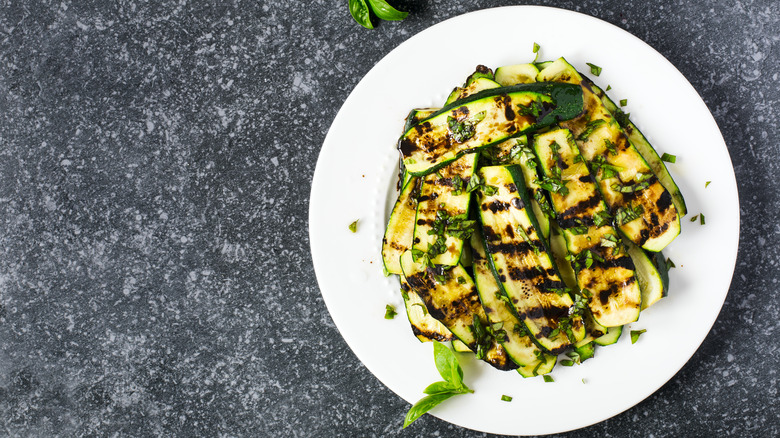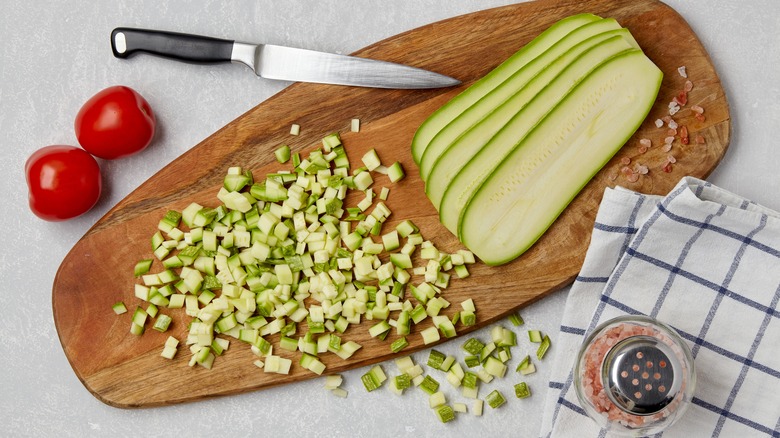Should You Salt Zucchini Before Or After Roasting? The Answer Is Complicated
By the looks of it, zucchini is a pretty fuss-free food. Compared to other types of squashes and gourds — namely the heavy butternut and pumpkin varieties — zucchinis are like the blameless little siblings, unsuspecting and innocent. You've probably been cutting them up and throwing them in the oven without a second thought. However, it turns out that there's been a bit of a debate surrounding these small, green, seasonal gourds. Like most baby siblings, they're much more complicated than anyone suspected.
So, what is it about these veggies that could be causing such a conundrum in the kitchen? It all has to do with their relationship with salt. It's not about how much of it you should use or what kind — it's about when you should be adding salt to your zucchini. Some people argue that you should salt them before you roast them, while others say that it's simply an unnecessary step nullified by your oven. Different sources say different things and, besides being confusing, it can have serious consequences for your stuffed zucchini boat dinner. Well, spare your zucchini, because we're getting to the bottom of it.
The case for salting zucchini
The case for salting zucchini is much like the case for salting eggplant. In fact, salting before cooking is actually Daniel Boulud's tip for prepping crispier eggplant, and zucchini is much the same. Science is on the side of salting in advance. When salt is sprinkled on the flesh of a water-dense fruit like zucchini and left to sit for a while, a process known as osmosis occurs. In about 20-30 minutes, droplets of water will appear on the surface as physical evidence of the excess moisture being drawn out of your zucchini.
But the question isn't whether or not salting your zucchini beforehand works. The question is if it's actually necessary. Sure, you could take the extra 20-30 minutes to salt your zucchini before you cook it, and it probably would come in handy with especially moist dishes like stuffed zucchini boats where it is even more difficult to achieve crispiness, but it might not be necessary in every instance. Your oven can handle all of the drying and crisping on its own — or at least, that's what the other side is saying.
The case for your oven
While salt and osmosis can do a handy job of drawing moisture out of your zucchini, so does your oven. That's actually exactly what the oven was designed to do: concentrate your food's flavor by drawing out moisture via the application of heat. It's why other things like bread, meat, and vegetables all come out nicely browned and caramelized without the need for a salt bath. Truth be told, your zucchini can, too. Some claim that waiting to salt zucchini until after it's cooked is actually the secret to getting perfectly roasted zucchini every time.
There are many methods for achieving zucchini with browned skin. Some obvious tactics include cranking your oven's heat up a notch or throwing the sheet pan in while the oven's pre-heating, as is often done with pizza crusts. There's also the basic rule of surface area. Cutting your zucchinis in a way that increases the amount of contact they get with your hot pan will yield crispier results. All of these methods can be utilized on their own or all together to achieve a crispier zucchini without the need for salt. Not to mention, they won't take up any more of your precious time than necessary.


